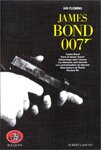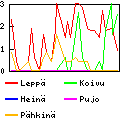Mardi, 14 juin 2011
Traduction: [ Google | Babelfish ]
Catégories : [ TV/Cinéma/Police Academy ]

Wikipedia
Captain Lassard, of the 16th precinct, cannot restore the peace in his area
since the neighborhood has been taken over by a mysterious gang. The chief of
police gives him 30 days to cleanup and allows him 6 new men, whom Lassard
gets from his brother, the Commandant of the Police
Academy. The
chief also promisses Lieutenant Mauser that if Lassard fails, he would become the
new Captain. The new recruits are at first causing trouble, but finally manage
to arrest a large number of gangsters. Mauser gets them released under false
pretenses. Lassard's brother suggest to organize a fair in the area to
strenghthen the bond between the inhabitants and the police, but the fair is
raided by the gangsters, Lassard is suspended and Mauser becomes the new
Captain. He then suspends Mahoney, who had played several tricks on him.
Lassard then convinces Mahoney to infiltrate the gang to discover their
hinding place. The operation is a success and the gang is finally arrested.
[ Posté le 14 juin 2011 à 09:25 |
1
commentaire |
lien permanent ]
Lundi, 13 juin 2011
Traduction: [ Google | Babelfish ]
Catégories : [ TV/Cinéma/Police Academy ]

Wikipedia
Mahoney, always causing trouble, is given a choice by the friend of his late
father who promised to watch over him: either the prison, or the police
academy (which has recently opened to anyone). He chooses the latter, hoping
to be expelled. Lieutenant Harris, the instructor, who disapproves of allowing
anyone to enter the academy, tries to get Mahoney to quit, but the latter
cannot quit, otherwise he is thrown in jail. After being the source of much
trouble, he is finally expelled, just before a major riot starts in town. He
then joins the other cadets, saves the life of Harris (along with another
cadet that Harris hates) and eventually graduates, with honors.
[ Posté le 13 juin 2011 à 10:55 |
1
commentaire |
lien permanent ]
Vendredi, 10 juin 2011
Traduction: [ Google | Babelfish ]
Catégories : [ Livres ]

© Amazon.fr
Masada is a planet controlled by the Theocracy, a religious, totalitarian
regime. With the help of the Polity, a pan-planetary empire, the rebels
overthrow the Theocracy and Masada joins the Polity. During the final days of
the rebellion, a Theocracy proctor named Tombs is attacked by the Technician,
a gigantic predatory lifeform called a hooder, one of the strange and few
lifeforms on Masada. The Technician skins Tombs alive, but leaves something
in his mind. Polity scientists repair Tombs body, and then wait twenty years
for his mind to recover. Two million of years ago, Masada was the home to the
Atheter, a species that committed global suicide to escape the Jain
technology, a technological virus that was taking over their society. The
humans on Masada step by step discover that the gabbleducks, large
pyramid-shaped animals, are what is left of the Atheter species. The latter
had built a Device, currently hiding somewhere in space, that erases
intelligence, and the gabbleducks are thus dumbed-down Atheters. The hooders
are war machines, and the Technician was used by one Atheter known as the
Weaver as a way to safekeep his mind (not all Atheters agreed to commit
suicide). When the Device detects again the presence of intelligence on
Masada, it comes back to erase it again, but the Polity people organize to
fight it, with little success. The Weaver's mind leaves Tombs' brain and
enters the one of a gabbleduck, reviving the Atheter race, and directs the
Technician in a (successful) attempt at destroying the Device, thus saving the
planet.
[ Posté le 10 juin 2011 à 10:34 |
pas de
commentaire |
lien permanent ]
Jeudi, 9 juin 2011
Traduction: [ Google | Babelfish ]
Catégories : [ TV/Cinéma ]

Wikipedia
London, 1895. Sir Robert Chiltern is a successful undersecretary of the
Foreign Office, and his marriage is one of the few truly happy ones in the
political class. Laura Chevely starts blackmailing Chiltern, threatening to
reveal that he had become wealthy after delivering inside information to her
former husband (who thenbecame immensly whealthy), in exchange for his
recommendation at the Parliament to support of a financial scheme in Argentina
where she had invested a lot of money. To motivate him, Laura Chevely reveals
Chiltern's secret to his rigorously honnest wife, Lady Gertrude, before
Chiltern has resolved to do it himself. Chiltern then visits his friend, the
idle Lord Arthur Goring, for advice. But Lady Gertrude had sent a letter to
the same Lord Goring for the same reason. Laura Cheveley then pays a visit to
Lord Goring, but she is mistaken for Lady Gertrude by the butler, who was told
to expected “a lady”. Laura Cheveley, seeing the letter from Lady Gertrude,
uses the opportunity to steals yet another embarassing document. When Sir
Robert discovers the presence of Laura Cheveley, he leaves the house in rage.
The same evening, Lord Robert delivers his speech to the parliament, and his
wife, accompanied by her sister in law Mabel, hears him speak against the
Argentinan scheme. Laura Cheveley then sends to Sir Robert the letter Lady
Gertrude had written to Lord Goring. When Sir Robert discovers the letter,
Lady Gertrude is forced to lie to preserve her marriage. Soon after, Lord
Goring proposes to Mabel. Sir Robert refuses, because of Lord Goring apparent
involvement with Laura Cheveley. But Lady Gertrude then tells the truth about
the letter and explains Laura Cheveley's presence in Lord Goring's home that
evening. Sir Robert then accepts and all is well that ends well.
[ Posté le 9 juin 2011 à 23:34 |
pas de
commentaire |
lien permanent ]
Samedi, 4 juin 2011
Traduction: [ Google | Babelfish ]
Catégories : [ TV/Cinéma ]

Wikipedia
See Wikipedia's The Matrix Reloaded
[ Posté le 4 juin 2011 à 16:23 |
pas de
commentaire |
lien permanent ]
Vendredi, 3 juin 2011
Traduction: [ Google | Babelfish ]
Catégories : [ Bière/Wadworth ]
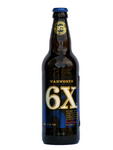
“fruit and malt aromas… hop flavours”
Kind of fruity, otherwise just another ale. Contains barley malt.
Wadworth & Co. Ltd., Devizes, Wiltshire, England. 4.3% alcohol.
[ Posté le 3 juin 2011 à 09:52 |
pas de
commentaire |
lien permanent ]
Samedi, 28 mai 2011
Traduction: [ Google | Babelfish ]
Catégories : [ Bière/Wadworth ]
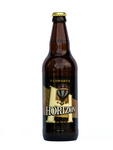
“zesty citrus aromas”
Citrusy smell and a taste of bitter almond. Contains barley malt.
Wadworth & Co. Ltd., Devizes, Wiltshire, England. 4.0% alcohol.
[ Posté le 28 mai 2011 à 19:40 |
pas de
commentaire |
lien permanent ]
Mardi, 24 mai 2011
Traduction: [ Google | Babelfish ]
Catégories : [ Bricolage ]
I finally got the courage to try out the new op
amp
model (LT1495) I received last week.
I tried out the current monitor
circuit,
and it works. The supply voltage for the op amp was 5 V, and I measured the
current going through a red LED, powered with 15 V (coming from a supposedly
12 V power adapter). The measurement was 33,6 mA instead of the 31 mA given
by the amperemeter. Not very accurate, but I don't actually need high
accuracy.
Next step: trying to re-build the motor speed-controller circuit, get it
stable enough that it doesn't reboot the Arduino all the time, and check how
the current monitor behaves when the current is switching on and off all the
time.
[ Posté le 24 mai 2011 à 21:52 |
pas de
commentaire |
lien permanent ]
Dimanche, 22 mai 2011
Traduction: [ Google | Babelfish ]
Catégories : [ Bière/Oakham ]
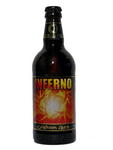
“a blend of five different hops from the Yakima Valley to create it's (sic) floral
aroma… complex fruits… dry, fruity, bitter finish”
Fruity and bitter. Contains barley and wheat.
Oakham ales, Woodston, PeterBorough, England. 4.4% alcohol.
[ Posté le 22 mai 2011 à 21:06 |
pas de
commentaire |
lien permanent ]
Vendredi, 20 mai 2011
Traduction: [ Google | Babelfish ]
Catégories : [ Bière/Oakham ]
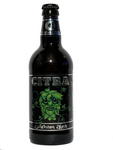
“single variety beer using only CITRA hops. pungent grapefruit, lychee and
goosberry aromas leading to a dry, bitter finish”
Smells definitely like lychee, and has a quite bitter taste. Contains barley
and wheat.
Oakham ales, Woodston, PeterBorough, England. 4.6% alcohol.
[ Posté le 20 mai 2011 à 19:25 |
pas de
commentaire |
lien permanent ]
Lundi, 16 mai 2011
Traduction: [ Google | Babelfish ]
Catégories : [ Bricolage/Arduino ]
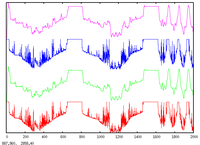
I hooked the Tyco slot-car controller to the Arduino's analog input with a
400 Ω pullup, and set the A/D converter's reference voltage to INTERNAL
(meaning 1.1 V). The sampling rate is 100 Hz and the output values are
between 0 and 1023. The movements are two successive slow
squeezing-and-releasing of the trigger, followed by three quick
squeeze-and-release.
- In the lower picture (red) are the raw data.
- In the second lower picture (green), the raw data is filtered by a 4th-order,
low-pass Butterworth filter, with a 5 Hz cutoff frequency.
- In the third lower picture (blue), a 32-levels quantization is applied to the
raw data.
- In the top picture (purple), the quantization is applied to the filtered
data.
A value of 1023 (the maximum) indicates that the electrical contact is broken
i.e., that the trigger is in the rest position or its maximum.
I have tried hardware filtering with capacitors (1 nF, 100 nF and 1μF), but
the digital filter gives the best results. I don't doubt that more advanced
hardware filters would have produced similar, if not better results, but they
would have required more components, and if you can afford to do it in
software, why bother with the extra hardware? Software filtering is amazing…
The code for the software filter has been generated on this very useful
website.
Additionally, conductive grease applied to the variable resistor may reduce
quite much the noise (or shortcut the whole coil of wire…)
[ Posté le 16 mai 2011 à 21:56 |
pas de
commentaire |
lien permanent ]
Dimanche, 15 mai 2011
Traduction: [ Google | Babelfish ]
Catégories : [ Bricolage ]
I don't have a proper explanation as for the why, but the op amp
problem
I had recently is solved by using a virtual ground set to 1/2 Vsupply.
My understanding there is that the differential amplifier acts as both an
inverting and non inverting amplifier, and that it needs a negative supply (or
a virtual ground, which amounts to the same thing) for the non-inverting part.
Using a virtual ground as mentioned above has two drawbacks:
- it brings the reference point of Vout to 1/2 Vsupply, which
makes it much less nice to use with the Arduino's analog input (only the
upper-half of the input range is used because of this offset) and
- the maximum allowable range for the signals is between 1/2 Vsupply
and Vsupply-1.5V (for the LM324), which is not much even when
Vsupply is 12 V.
Moreover, the differential amplifier needs well matched resistors: R1||R2 =
R3||R4 (R1||R2 is the equivalent resistance of R1 in
parallel with R2), othwerwise it has an additional DC offset which gets amplified by the
gain of the differential amplifier, making the whole thing useless for my purpose of
amplifying the very small voltage across a shunt.
On the bright side though, I found another op amp, the LT1495, that can accept
inputs beyond Vsupply and with a very low input offset. Its only
drawback is that it costs 25 times more than the LM324 (which was very, very
cheap, but still).
[ Posté le 15 mai 2011 à 20:52 |
1
commentaire |
lien permanent ]
Traduction: [ Google | Babelfish ]
Catégories : [ Bière/Oakham ]
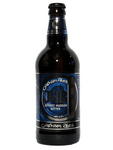
“Sir Jeffrey Hudson was an adventurer, courtier and duelist in the service of
King Charles I… citrus fruitness and dry bitter finish.”
Definitely citrusy, and with maybe a hint of bitter almond in the aftertaste.
Contains barley and wheat.
Oakham ales, Woodston, PeterBorough, England. 4.2% alcohol.
[ Posté le 15 mai 2011 à 12:36 |
pas de
commentaire |
lien permanent ]
Samedi, 7 mai 2011
Traduction: [ Google | Babelfish ]
Catégories : [ Bricolage/Arduino ]
I just tested the first prototype of the speed controller for the Tyco slot
cars. Currently, the Arduino reads the potentiometer with analogRead() and
applies PWM (with analogWrite()) on the base of a BC547 transistor. The
transistor acts as a driver for a FQP70N10 MOSFET which controls the motor.
The MOSFET doesn't seem to heat at all (I selected this model for exactly that
reason) and speed control works (i.e., I can drive the car on a simple ring
circuit, down to quite low speed).
My initial idea was to drive the MOSFET directly with the Arduino, but I
noticed after buying a pair of those that they it's not a logic-level MOSFET.
Driving it with 5 V would theoretically work (I need about 1 A, which is well
within the capabilities of the device), but the internal resistance would be much
higher that the value touted on the datasheet, and thus dissipate more heat
(exact figures for the resistance at 5 V are not available from the
datasheet).
This was a proof of concept, and the concept is therefore proven, I can start
working on measuring, with the Arduino, the current delivered to the motor.
[ Posté le 7 mai 2011 à 22:21 |
pas de
commentaire |
lien permanent ]
Catégories : [ Cuisine/Chocolats ]
Kultasuklaa, Tummasuklaa, 70%:
pas mauvais, mais rien de remarquable.
Kultasuklaa, Naturel tumma, 54%:
plus sucré que le précédent, avec un coté « biscuit au beurre » industriel
[ Posté le 7 mai 2011 à 22:20 |
pas de
commentaire |
lien permanent ]
Jeudi, 21 avril 2011
Traduction: [ Google | Babelfish ]
Catégories : [ TV/Cinéma/Marvel ]

Wikipedia
Tony Stark inherited a large weapon-manufacturing company. While in
Afghanistan for a demonstration of the latest missile of Stark Industries to
the US military, he is kidnapped by rebels and forced to build a control
system for the missiles (that the rebels seem to have got already, from an
unknown source). Wounded by shrapnel during his kidnapping, he is saved by
another prisoner, a doctor, who puts an electromagnet on his chest to prevent
remaining pieces of metal to enter his heart. Instead of building the control
system, Stark first makes a miniature generator to power his electromagnet,
but also the iron armored suit that he builds next. With the suit, he escapes
the rebels and is later located by US troops. Months after having left for
Afghanistan, he is back in the US. There, he wants to stop his company from
making weapons, but he is pushed away from executive decisions by Stane, his
father's old partner who actually runs the company. Left with plenty of free
time, he builds a new armored suit, around a new version of the generator. The
suit contains many weapons, an AI and can fly. Stark then flies to Afghanistan
as the Iron Man to destroy the Stark Industries weapons in posessions of the
rebels. Back in the US, Stark asks his faithful secretary, Pepper Potts, to
hack into the company's computer to find the origin of the weapons. She finds
out that Stane had sold them to the rebels in exchange for them killing Stark.
In the meanwhile, the rebels have found the remnants of Stark's first suit and
deliver them to Stane who uses this new technology to make armored suits of
his own. Since he cannot replicate the miniature reactor, he goes to Stark's
house and steals it. Starks survives by reusing the older version, and
fights Stane as Iron Man. Starks obviously wins and eventually tells the press
he is the Iron Man (even though his military advisor had prepared a cover
story).
[ Posté le 21 avril 2011 à 19:57 |
2
commentaires |
lien permanent ]
Dimanche, 17 avril 2011
Traduction: [ Google | Babelfish ]
Catégories : [ Bière/Inverlamond ]
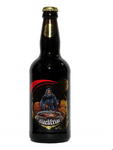
“rustic earthy character, roasty, chocolaty flavours and typical fruity,
spicy hints… It is unusually hoppy for a Scottish ale.”
Just another strong ale. Contains barley and wheat malts.
The Inverlamond Brewery Limited, Perth, Scotland. 7.0% alcohol.
[ Posté le 17 avril 2011 à 19:13 |
pas de
commentaire |
lien permanent ]
Samedi, 16 avril 2011
Traduction: [ Google | Babelfish ]
Catégories : [ Bière/Brewdog ]
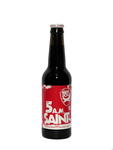
Brewdog.com
The text on the bottle is as idiotic and uninformative as usual.
Smells quite much of blackcurrant, and tastes reasonnably bitter. Contains
barley.
BrewDog Ltd., Fraserburgh, Scotland. 5.0% alcohol
[ Posté le 16 avril 2011 à 23:43 |
pas de
commentaire |
lien permanent ]
Traduction: [ Google | Babelfish ]
Catégories : [ TV/Cinéma ]

Wikipedia
From Wikipedia:
In the 1960s, a 20-year-old girl nicknamed "Babydoll" is institutionalized by
her stepfather at t mental hospital after she is blamed for the death of her
younger sister (actually defending her against the stepfather who discovered
that, at the death of their mother, they would inherit everything). Blue
Jones, one of the asylum's orderlies, is bribed by Babydoll's stepfather into
forging the signature of the asylum's psychiatrist, Dr. Vera Gorski, to have
Babydoll lobotomized, so she can neither inform the authorities of the true
circumstances leading to her sister's death, nor reclaim her inheritance. As
she enters the institution, she takes note of several items that would be
integral if she were to attempt an escape.
In the days prior to her lobotomy, Babydoll retreats to a fantasy world in
which she is newly arrived in a brothel owned by Blue, whom she envisions as a
mobster. She befriends four other dancers-Amber, Blondie, Rocket and Rocket's
older sister, Sweet Pea. Dr. Gorski is envisioned as the girls' dance
instructor, and informs Babydoll that her virginity will be sold to a client
known as “The High Roller”, who will be arriving in five days. Madam Gorski
then encourages Babydoll to perform an erotic dance, during which she
fantasizes that she is in feudal Japan, where she meets the Wise Man. After
expressing her desire to escape, the Wise Man presents Babydoll with weapons
and tells her that if she is to escape, she will need to collect five items: a
map, fire, a knife, a key and a fifth, unrevealed item that would require
great sacrifice. Before parting ways, the Wise Man instructs Babydoll to
defend herself, and she is confronted by three demonic samurai, which she
defeats. As her fantasy ends, Babydoll finds herself back in the brothel, her
dance impressing Blue and other onlookers.
Inspired by her vision of the Wise Man, Babydoll convinces her friends to
prepare an escape from the brothel. She plots to use her dances as a
distraction whilst the other girls obtain the tools for their escape. During
each of her dances, Babydoll imagines adventurous events that mirror their
efforts. These episodes include infiltrating a bunker protected by
steam-powered WWI German soldiers to gain the map (mirrored by Sweet Pea
entering Blue's office and copying a map of the brothel); storming an
orc-infested castle to cut two fire-producing crystals from the throat of a
baby dragon (mirrored by Amber stealing a lighter from the breast-pocket of a
client); and boarding a train and combating mechanized guards to disarm a bomb
(mirrored by Sweet Pea stealing a kitchen knife from the belt of the brothel's
cook). During the last of these fantasies, the dance is interrupted, and in
the fantasy Rocket sacrifices herself to save Sweet Pea and is killed when the
bomb detonates. This is paralleled in the brothel when the cook attempts to
stab Sweet Pea as she stole the knife, but Rocket dives in front of the blade
and is stabbed herself.
While the girls attempt to procure the knife, Blue, suspecting that the girls
are plotting something, overhears Blondie relaying Babydoll's plan to Madam
Gorski. After discovering the gruesome scene in the kitchen, Blue has the
grieving Sweet Pea locked in a utility closet and confronts the remainder of
the girls backstage. He proceeds to make examples of Amber and Blondie,
shooting both of them. He then attempts to rape Babydoll, but she stabs him
with the kitchen knife and steals his master key from around his neck. She
frees Sweet Pea from the closet and the two start a fire with the stolen
lighter so that, as a result of the fire alarm, the institution's checkpoint
doors unlock. The two manage to escape into the courtyard, where they find the
front gate to be blocked by henchmen. Babydoll deduces that the fifth item
needed for the escape is in fact herself, and that her sacrifice is needed to
complete Sweet Pea's story. She distracts the guards, allowing Sweet Pea to
slip out the front gate.
As the henchmen get the better of Babydoll, the scene then cuts back to the
asylum in which the surgeon has just performed her lobotomy. As he removes his
orbitoclast, he is perturbed by Babydolls expression and starts to question
Dr. Gorski as to why she authorized the procedure. Gorski realizes that Blue
had forged her signature, and summons the police, who apprehend Blue as he
assaults a catatonic Babydoll. Elsewhere, Sweet Pea waits at a bus station
where she is stopped by suspicious police. The bus driver, revealed to be the
Wise Man from Babydoll's fantasies, misleads the police and allows Sweet Pea
to board without a ticket.
[ Posté le 16 avril 2011 à 23:30 |
1
commentaire |
lien permanent ]
Mardi, 5 avril 2011
Traduction: [ Google | Babelfish ]
Catégories : [ Livres ]

© Amazon.fr
Sursamen is a shell-world, an artificial “planet” made of fifteen concentric
layers. On the eigth level live the Sarl, who are trying to conquer the
Deldeyn, inhabitants of the ninth level. These not-yet-advanced civilizations
are supervized by another race, the Oct, who are themselves supervised by yet
another race, and so on. Hausk, king of the Sarl, is wounded in battle and
then murdered by his closest counsellor tyl Loesp. Prince Ferbin is
accidentally witness to the scene. He knows that tyl Loesp will be trying to
kill him next, so with the help of his manservant Holse he tries to reach the
surface of Sursamen and from there hopes to find Hyrlis, a Culture agent who
was a friend of Hausk. Ferben hopes the Culture, who has spies everywhere,
would have recorded tyl Loesp's treason so that he can prove his guilt. After
a long and complicated travel through many worlds Ferbin and Holse finally
find Hyrlis, but he is now an outcast from the Culture and cannot help the
prince. Ferbin then tries to locate his sister Djan Seriy, who had left
Sursamen to become an agent for the Culture's Specian Circumstances service.
Having heard of her father's death, she is herself travelling towards
Sursamen. Meanwhile, Ferbin's younger brother Oramen has become Prince Regent
under tyl Loesp's supervision, until he comes of age (Ferbin is officially
dead, even though tyl Loesp learns the truth and tries to get him killed). Tyl
Loesp planes to get Oramen killed eventually and names him governor of the
just-conquered Deldeyn capital on the ninth level, in order to keep him away
from the court on the Sarl's level. Oramen also supervises an archeological
dig in a very difficult area that has just been made possible by a rare
“astronomical” event (it still all happens inside one level of Sursamen).
The Oct have actually manipulated tyl Loesp so that he takes over the ninth
level in time to control the archeological research, and secures the artefact,
the Sarcophagus, that lies at the bottom of it. The Oct are convinced the
Sarcophagus contains one of their ancestor, conserved in stasis for billions
of years. But the creature is actually an Iln, a destroyer of shellworlds.
Allowed to escape, the Iln kills everyone around it (including tyl Loesp's
army who was attacking to kill Oramen, Oramen, and the whole Sarl settlement
on the ninth level) and then plunges at the core of the shellworld where lives
a Xinthian (rare, gigantic creatures that live at the bottom of shellworld and
maintain them), know the the Sarl as the WorldGod. Djan Seriy, Ferbin and
Holse arrive just in time to chase the Iln and kill it. Djan Seriy and Ferbin
die in the attempt.
[ Posté le 5 avril 2011 à 21:18 |
pas de
commentaire |
lien permanent ]
Samedi, 2 avril 2011
Traduction: [ Google | Babelfish ]
Catégories : [ TV/Cinéma ]

Wikipedia
Dany is a kid who prefers going to the movie and watch the adventures of his
favourite hero, Jack Slater rather than go to school. His friend Nick, the
projectionist of the theatre invites Dany to watch the newest Jack Slater
before the premiere. Nick gives Dany a magical ticket that was given to him by
Houdini; but Nick never had the courage to try it. Nick splits the ticket and
gives Dany the stub. During the movie, the ticket activates and Dany enters
the movie just after Slater witnesses the murder of his cousin. Dany never
manages to convince Slater that he knows who is the bad guy (Dany saw the
villain, Vivaldi, and his henchman, Benedict, reveal their plan earlier on
screen), but Slater accepts to pay a visit to Vivaldi's house, which raises
Benedict's suspicions. When Dany and Slater are attacked by Benedict, the
latter takes Dany's magical ticket and later discovers its use. Meanwhile,
Dany and Slater discover Vivaldi's plan to kill his rivals at a funeral, and
the heroes save the day. When trying to apprehend Vivaldi and Benedict, the
latter flees to the real world using the ticket, and Dany and Slater manage
just to follow him through the portal. In the real world, Slater discovers he
really is only a fictional character, that the writers gave him a miserable
life and that he doesn't like violence anymore. Meanwhile, Benedict visits the
theaters of New York City, looking for other movie villains. He finds the
Ripper, the villain in the previous Jack Slater movie, and asks him to kill
Arnold Schwarzenegger, the actor playing Slater. At the premiere of the new
movie, Dany and Slater confront the Ripper and kill him. Benedict is soon
killed, but slater is mortally wounded. To save him, Dany understands Slater
must return into his movie. Dany steals the ambulance driving Slater to a
hospital and takes him to Nick's theatre. He finds the other half of the magic
ticket in the trash and gives it to Slater, who quickly returns into his
world, with barely a scratch.
[ Posté le 2 avril 2011 à 16:54 |
1
commentaire |
lien permanent ]
Mercredi, 30 mars 2011
Traduction: [ Google | Babelfish ]
Catégories : [ TV/Cinéma ]

Wikipedia
Lake Springfield is terribly polluted, partly by Homer's fault. The EPA
decides to islate Springfield under a gigantic dome. The population soon
discover that Homer is the cause of it and try to lynch the family, but they
manage to escape and flee to Alaska. When Marge sees on TV that the EPA plans
to destroy the city, she decides to go back, but Homer refuses. Marge and her
family are caught and put back under the dome. Meanwhile, thanks to an inuit
shaman, Homer has an epiphany and belives he must save the town in order to
save himself. A bomb is lowered by the EPA into the dome through a small hole.
Homer causes it to drop into it, but manges to take it out and it eventually
explodes and destroys the dome.
[ Posté le 30 mars 2011 à 23:45 |
1
commentaire |
lien permanent ]
Vendredi, 18 mars 2011
Catégories : [ Cuisine/Chocolats ]
Plamil Organic Dark
Chocolate, 87% : amer et fade. Sans intérêt.
Pacari
Los Rios, Équateur, 72% : structure pleine de bulles (défaut de fabrication ?), herbal, amer.
Pacari
Manabi, Équateur, 65% : frais, citron, un peu amer
Pacari
Esmeraldas, Équateur, 60% : doux, fleuri, miel.
[ Posté le 18 mars 2011 à 21:40 |
pas de
commentaire |
lien permanent ]
Mercredi, 16 mars 2011
Traduction: [ Google | Babelfish ]
Catégories : [ Cuisine/Chocolats ]
Michel Daniel, Ouganda 80% : amer, me rappelle un peu la mer (?)
Michel Daniel, Kumabo (Tanzanie, Ghana, Sao Tomé) 80% : frais, amer
Michel Daniel, Sao Tomé 66% : très doux, bonbon ou biscuit, vanillé aussi,
vraiment très bon
Michel Daniel, Nouvelle Guinée 64,5% : fumé
Michel Daniel, Ghana 60,4% : doux, madeleine, fleuri
Thierry Mulhaupt, Chuao 68% : un peu acide, intense, houblon (?)
[ Posté le 16 mars 2011 à 22:10 |
pas de
commentaire |
lien permanent ]
Catégories : [ Cuisine/Chocolats ]
Sate herkkutuote : ressemble bigrement au
Taloussuklaa de Fazer. Pas terrible.
Sate herkkutuote Kärmes, Ecuador 71% :
légèrement acide et astringent, un peu fleuri, un peu amer.
Sate herkkutuote Tumma suklaapatukka, Peru
64% : très doux, très bon.
[ Posté le 16 mars 2011 à 21:38 |
pas de
commentaire |
lien permanent ]
Lundi, 14 mars 2011
Traduction: [ Google | Babelfish ]
Catégories : [ Bricolage/Arduino ]
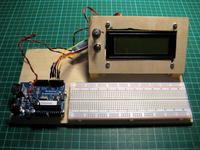
Here's a mini-workbench for Arduino prototyping, made of 6.5 mm plywood.
The Arduino board stands on whatever-they-are-called threaded thinggies you
use to screw the motherboard into the computer case without it touching the
metal. Arduino screw holes are 3.2 mm in diameter, so I had to drill them to
3.5 mm. It survived the treatment.
The breadboard had an adhesive back, so this one was easy.
The LCD has one potentiometer (top) for contrast and one switch for the LED
backlight (depending on the power source, backlight may consume too much
current, so it can be switched off if needed). The connectors at the end of
the ribbon cable are made from component legs and shrink tube.
The drawback is that now it takes much more space than it used too…
[ Posté le 14 mars 2011 à 22:29 |
pas de
commentaire |
lien permanent ]
Vendredi, 11 mars 2011
Traduction: [ Google | Babelfish ]
Catégories : [ Bière ]
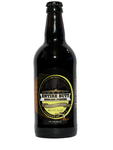
“Historically the term used to describe a Porter blended from a variety of
ales, Entire Butt uses 14 different malts and 3 hops to recreate this
forgotten style of Porter. The beer is… distinctly vinous. It has little hop
character as essentially flavour is derived from the malts: Pale marris
otter,lager, wheat, pale crystal, dark crystal, darck chocolate, pale
chocolate, black, roast barley, cara malt, torrified wheat, amber, brown and
malted oats.”
Noticeably bitter, not just another ale, but I can't identify any distincive
flavour. Contains barley, wheat and oats.
Salopian Brewery, Shrewsbury, Shropshire, England. 4.6% alcohol.
[ Posté le 11 mars 2011 à 20:31 |
pas de
commentaire |
lien permanent ]
Samedi, 5 mars 2011
Traduction: [ Google | Babelfish ]
Catégories : [ Informatique ]
« Alors tu vois, le processeur c'est comme le moteur de ta voiture. Et le
clavier c'est comme le volant… – Et le système d'exploitation c'est comme
l'essence alors ? – Euh… »
C'est n'importe quoi hein ? La comparaison avec la voiture ne vaut pas
tripette, parce que la voiture n'est pas un automate programmable (enfin, pas
encore). Voila une comparaison qui me paraît plus correcte (arrêtez-moi si je
me trompe): le restaurant. Dans un restaurant et dans le désordre, on
trouve:
- Le cuisinier : c'est lui qui fait (presque) tout le travail, comme le
processeur.
- Le cuisinier lit des recettes et les exécute : ce sont les programmes.
- Les recettes sont composées de gestes à effectuer qui indiquent au
cuisinier comme agir: ce sont les instructions.
- Les recettes indiquent comment transformer des ingrédients crus (viande,
légumes…) : ce sont les données fournies en entrée au programme.
- Ces ingrédients sont transformés en plats : ce sont les données fournies
en sortie par le programme.
- Les ingrédients et les plats doivent être posés quelque part à un moment
donné, par exemple sur des plans de travail : ces derniers servent de
mémoire centrale.
- Certains ingrédients crus doivent être stockés pendant un certain temps,
par exemple dans des réfrigérateurs : ce sont les mémoires de masse.
- Il existe un certain nombre d'opérations qui sont souvent répétées et que le
cuisinier a appris à effectuer lors de sa formation professionnelle (émincer,
fouetter, incorporer, ciseler…): ces instructions sont l'équivalent du
noyau du système d'exploitation.
- Il existe aussi des recettes de base qui sont souvent
répétées et qui entrent dans la composition des plats (roux, bouillon, pain…) :
elles forment l'interface de programmation qui sert de base à tous les
programmes. Certaines de ces recettes peuvent être commandées directement par le
client (le pain par exemple), et représentent les logiciels utilitaire (ou
commandes de base) fournies avec le système d'exploiatation.
- Le restaurant a des clients : ce sont les utilisateurs.
- Les client s'addressent à un serveur : ce dernier joue le rôle de
l'interface utilisateur.
- Le client peut choisir dans un menu ce qu'il désire manger, et donc les
recettes que le cuisinier va executer : ce menu est la liste des programmes
que l'utilisateur peut lancer, qui sont parfois regroupées dans un menu
(déroulant ou non).
- dans les restaurants, le cuisinier est rarement seul, il est aidé par le
boulanger, le patissier, le saucier: ce sont des coprocesseurs,
spécialisés dans l'exécution de certaines tâches.
Enfin, on peut considérer que les casseroles sont comme les registres du
processeur, elles servent de stockage temporaire pour les opérations
élémentaires.
Après, la comparaison a ses limites: on peut copier des données, mais on ne
copie pas un gateau au chocolat…
Aussi, il manque la possibilité au client de donner des ingrédients à la
cuisine, c'est à dire à l'utilisateur d'entrer des données dans l'ordinateur.
[ Posté le 5 mars 2011 à 22:00 |
2
commentaires |
lien permanent ]
Traduction: [ Google | Babelfish ]
Catégories : [ Bière/Orkney ]
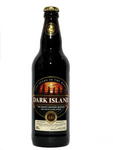
“On the nose, this dark beer offers bitter chocolate, figs, toffee and hints
of fruits. On the palate, coffee-and-chocolate flavours, followed by figs,
dates and dried fruits … and an aftertaste of fruits and hop bitterness.”
Chocolate and coffee, slightly acid too. Contains malted barley and malted
wheat.
Sinclair Breweries Ltd, The Orkney Brewery, Stromness, Orkney, Scotland. 4.6%
alcohol.
[ Posté le 5 mars 2011 à 21:53 |
pas de
commentaire |
lien permanent ]
Mardi, 1er mars 2011
Catégories : [ Râleries ]
In English below
Il m'est venu l'autre nuit l'idée suivante : si on transposait les
restrictions imposées sur la plupart des DVD dans la vie réelle, qu'est-ce que
ça donnerait?
Imaginons qu'on veuille acheter une copie d'une œuvre d'art. Au lieu de
recevoir l'objet attendu, on se retrouve avec:
- l'objet, mais enfermé dans une vitrine
- la vitrine est intégralement faite de glace sans tain, on ne peut donc voir
l'objet qui s'y trouve, sauf si celui-ci est éclairé depuis l'intérieur de la
vitrine,
- la vitrine est fermée à clef,
- la clef de la vitrine doit être achetée à part,
- cette clef est dans une boite scellée, sans ouverture apparente,
- il est interdit par la loi d'ouvrir la boite pour en sortir la
clef,
- lorsqu'on pose la boite sur la vitrine, la lumière s'allume, mais
seulement après que la boite nous ait bien fait comprendre qu'on est indigne
de poser nos yeux sur l'objet qui s'y trouve,
- on n'a pas le droit de ranger la boite n'importe où dans la maison, et la
partie de la maison où est rangée la boite ne nous appartient plus.
Imaginons maintenant qu'on acquierre une copie pirate de ladite œuvre d'art :
on reçoit une copie qui est éventuellement plus petite que la version qui
aurait été livrée dans la vitrine, et peut-être un peu moins bien polie, mais
au moins, on peut en disposer à sa guise.
Après ça, c'est vous qui voyez.
I got the following toughts the other night: how would it be if you would
transpose into real life the restrictions that are imposed on most DVD?
Let's imagine you wants to buy a copy of a work of art. Instead of getting the
expected object, you would have:
- The object, but enclosed in a display cabinet.
- The display cabinet would be entirely made of half-silvered mirrors, so that
you cannot see the object, except if it's lighted from the inside of the
cabinet.
- The display cabinet is locked.
- You need to buy separately the key to the display cabinet.
- This key is in a sealed box, with no visible opening.
- It is forbidden by law to open the box and extract the key.
- When you place the box on the top of the display cabinet, the light goes
on, but only after it has been made very clear that you are not worth watching
the object.
- You are not allowed to place the box wherever you want in your house, and
the place where the box is located is not your property anymore.
Let's now imagine that you acquire a pirate copy of said work of art: you get
a copy that is possibly smaller than the one that would have been delivered in
the display cabinet, and possibly a bit less well polished, but at least, you
can do with it whatever you please.
After that, it's your call.
[ Posté le 1er mars 2011 à 21:49 |
pas de
commentaire |
lien permanent ]
Traduction: [ Google | Babelfish ]
Catégories : [ Bière/Brewdog ]
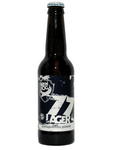
Flowery smell, quite bitter. Contains barley.
BrewDog Ltd., Fraserburgh, Scotland. 4.7% alcohol
[ Posté le 1er mars 2011 à 19:49 |
pas de
commentaire |
lien permanent ]
Samedi, 26 février 2011
Traduction: [ Google | Babelfish ]
Catégories : [ Bière/Brewdog ]
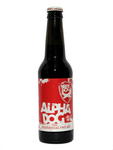
“The Beer scene is sick. And we are the fucking doctor.”
Right. I'd rather be treated by a non-fucking doctor, if it's all the same to
you. Anyway, everybody knows there is only one Doctor.
Smells kind of like raspberries and litchi. Quite bitter, but less than other
BrewDog brews. Contains barley.
BrewDog Ltd., Fraserburgh, Scotland. 4.5% alcohol
[ Posté le 26 février 2011 à 19:50 |
pas de
commentaire |
lien permanent ]
Dimanche, 20 février 2011
Traduction: [ Google | Babelfish ]
Catégories : [ Bière/Orkney ]
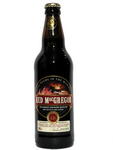
“ruby-red beer, floral and fruity, with notes of violets, cherry, toffee and
caramel… hints of roasted malt, with a biscuit malt and spicy hop finish.”
Fruity yes, cherries maybe, the violets I haven't found. Contains malted
barley and malted wheat.
Sinclair Breweries Ltd, The Orkney Brewery, Stromness, Orkney, Scotland. 4.0%
alcohol.
[ Posté le 20 février 2011 à 17:47 |
pas de
commentaire |
lien permanent ]
Samedi, 19 février 2011
Traduction: [ Google | Babelfish ]
Catégories : [ Bricolage/Arduino | Informatique ]
If you are used to Vim as a text editor, the Arduino IDE is terrible to use.
After a little bit of fiddling, here are my tips to program an Arduino using
Vim.
Makefile
To compile the Arduino software, I found the Makefile by Alan
Burlison
and I modified it to suit my needs. You can get the modified
version and use
it at your own risks.
It has been modified as follows:
- Support for arduino 0022 only (but you can change the version number in the
Makefile). Versions prior to 0018 are not supported.
- Binaries are located in
/usr/bin.
- The board is by default
atmega328.
- The programming protocol is
stk500v1 and the speed is 57600 bauds.
- The terminal emulator is
xterm and the serial communication software is
picocom.
- The serial port is
/dev/ttyUSB0.
All these default values can be changed in the Makefile.master file.
Moreover, the following changes have been made:
- After killing the serial communication software, sleep for 1 second
- Before starting the programmer, the DTR signal is triggered with
stty to
reset the board (programming would otherwise not be possible)
- Warnings remain warnings (GCC's
-Werror flag has been removed, because I
had a weird warning that I don't know how to fix)
- The sketch's
.pde file is hardlinked into the build directory, and is
#included in sketchname_pde.cpp instead of copied into it. This
allows GCC to report the errors on the proper line of the .pde file as well
as report the proper path for this file in its error messages (when compiling
sketchname_pde.cpp, GCC is in the build directory; since it would include
../sketch.pde, the error messages relative to this file would point to a
file name starting with ../, but since Vim is in the parent directory, the
path to sketch.pde would be wrong and Vim's QuickFix fails to find the file).
- Linking is made by
gcc instead of g++ because of a bug in linking to
libm (which is needed if you want to do floating point computations, so it
links against it by default).
- A
vim: line has been appended to make Vim recognize the file as a
Makefile
To use this Makefile, put Makefile.master into your sketchbook directory,
and create in your sketch's directory a Makefile which contains include
../Makefile.master. If you want to add extra libraries (here RF12, GLCDlib
and Ports), it looks like this:
LIBS = RF12 GLCDlib Ports
LIB_DIRS = $(addprefix ../libraries/,$(LIBS))
include ../Makefile.master
Typing make inside the directory where the Makefile resides builds the
sketch. make upload uploads it, make monitor starts the serial
communication software on the serial port and make upload_monitor does both
sequentially. Finally, make clean cleans up the build directory created
when buidling the sketch.
Arduino Syntax File for Vim
Get arduino.vim by
Johannes Hoff and put it in your ˜/.vim/syntax/ directory. It will let Vim
recognize .pde files are as arduino, turning on C++ syntax highlighting
plus Arduino-specific keywords.
Tabs
Vim allows to open multiple tabs: run vim -p *.* in your sketch's directory,
and it opens all the files (except the Makefile) in separate tabs. Use
Ctrl-PgUp and Ctrl-PgDown to switch between tabs.
To close all tabs at once, you can use :tabd q, but this is tedious, so I
made a shortcut: Add command Q tabd q to your .vimrc and you can close all
the tabs at once using :Q. You can do the same with :w, :wq and :x if
you want.
Type :help tab to learn more about tabs (especially, :tabe xyz opens file
xyz in a new tab. I thought you'd be glad to know).
QuickFix
You can call
make from within Vim by typing
:make but that's tedious also.
I added the following mappings to my
.vimrc:
imap <F9> <ESC>:make<CR>
map <F9> :make<CR>
This lets F9 calls :make (whether you're in command mode or in insert mode). You
may want to add set autowrite in your .vimrc so that your files are
automatically written when you call make.
Now, at least in Debian, after the call to :make has completed, when you return to your file's
screen Vim redirects you to the file that contains the first error in make's
output. In my setup, this is a warning in a file belonging to Arduino's core,
which I don't want to modify. I could of course press Ctrl-O to return to
the file I was editing just before running :make, but that's too much work.
What I wanted is to be able to let Vim jump to the files containing warnings
and errors, but to force it to ignore system files. The solution is then to
add to your ˜/.vimrc the following (all in one line, without spaces after the
equal sign):
autocmd Filetype arduino set errorformatˆ=\%-G../libraries\%.\%#,\%-G../../libraries\%.\%#,%-G/space/mweber/tmp/arduino-0022\%.\%#
It requires some tuning, because your Arduino directory is probably not in
/space/mweber/tmp/arduino-0022, but since you're smart, you have already
understood how to adapt it to your setup.
Please note that to get this setup to work properly, you need to append //
vim:ft=arduino to all of the .pde, .cpp and .h files belonging to your
sketches, otherwise the Vim will not do the ignoring above. And for this to
work, modelines must be enabled by adding set modeline to your
˜/.vimrc.
Finally, since you opened all your files in tabs already, tell Vim not to open
the file containing a warning/error in the current tab, but rather in the tab
that already contains the file. You do this by adding set switchbuf=usetab
in your ˜/.vimrc.
In short, your ˜/.vimrc has now these extra lines:
command Q tabd q
command W tabd w
set modeline
set autowrite
set switchbuf=usetab
imap <F9> <ESC>:make<CR>
map <F9> :make<CR>
autocmd Filetype arduino set errorformatˆ=\%-G../libraries\%.\%#,\%-G../../libraries\%.\%#,%-G/space/mweber/tmp/arduino-0022\%.\%#
[ Posté le 19 février 2011 à 19:22 |
2
commentaires |
lien permanent ]
Samedi, 12 février 2011
Traduction: [ Google | Babelfish ]
Catégories : [ Bricolage ]
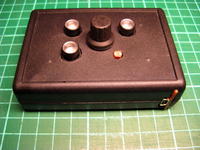
Here's the Button Box. It has three illuminated push-buttons, one knob (which
also acts as a push-button) and one light-dependent resistor (the small
thinggy on the lower-right corner) which are controlled by an RBBB
microcontrller (software-compatible with the Arduino). Here's the
control software.
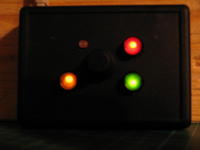
The push-buttons contain each one bi-color LED (red-green); its color depends
on the direction of the current. Each LED which is controlled using PWM, which
allows to quickly reverse the direction of the current and create the illusion
of a yellow/orange color. Moreover, the Box senses the amount of ambient light
(with the light-dependent resistor) and adjust the intensity of the light
depending on that: by night, the LEDs are on only 1/64th of the time, while in
daylight they are on at 100%, making them more visible.
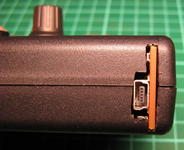
It connects to the computer through a serial-to-USB adapter. It's a bit ugly
like that, but who cares.
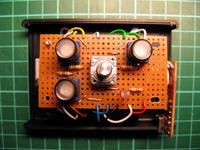
The current through the LEDs is limited by a 150 Ω resistor. The
push-buttons use the microconstroller's internal pull-up resistors. The
light-dependent resistor (rated 4 – 11 kΩ, whatever this exactly means)
forms a voltage divider with a 1 kΩ resistor, and its value is read by
one of the analog inputs of the microcontroller.
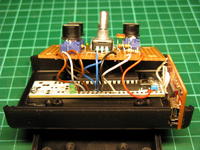
The white PCB is the RBBB, which is powered by the USB-BUB (serial-to-USB
adapter, based on an FTDI chip). It's not the cheapest solution, but those
components were the easiest to obtain.
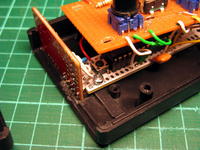
The USB-BUB has its outputs rewired to the row of holes along its side, and is
soldered sideways to the RBBB using a row of pin headers. The RBBB is then
screwed through one ready-made hole to the bottom of the box through an
additional piece of plastic glued (with cyanoacrylate glue) to the bottom.
This gives a thickness of almost 5 mm which is enough to hold the screw (a bit
thicker would have been better). The same is done to the other end of the
RBBB which has a similar hole. This holds the USB-BUB enough for the USB cable
to be inserted and removed.
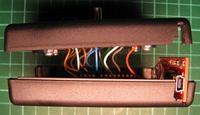
Side view. ABS project boxed are nice, because they are easy to drill and cut
through with a hacksaw or even with a knife for smaller details.
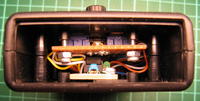
Inside view with the side walls removed. It's quite tight inside, but it fits
nicely.
[ Posté le 12 février 2011 à 23:04 |
3
commentaires |
lien permanent ]
Vendredi, 11 février 2011
Traduction: [ Google | Babelfish ]
Catégories : [ Bière/Brewdog ]
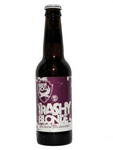
“malt body… passion fruit hop”
The first sniff reminded me of litchi, but after that it was just another ale.
Quite bitter, it seems to be a characteristic of this brewer. Contains barley.
BrewDog Ltd., Fraserburgh, Scotland. 4.1% alcohol
[ Posté le 11 février 2011 à 19:01 |
pas de
commentaire |
lien permanent ]
Lundi, 7 février 2011
Traduction: [ Google | Babelfish ]
Catégories : [ TV/Cinéma ]

Wikipedia
After Voyager 2 transported a message to the distant stars, a UFO flies over
the USA and is shot by the Air Force. The alien arrives near Jenny's house,
where it takes the form of her late husband. He then asks her to drive him to
Winslow, Arizona where he must rendez-vous with his mothership 3 days later.
On the way, he learns some amount of English, and about the ways of humans.
Jenny is at first afraid, but she eventually falls in love with him. They are
chased by the federal police and the army, but eventually manage to escape
thanks to the help of a SETI scientist, advisor the the federal police, but
who doesn't approve of the methods of the government. The alien eventually
leaves, leaving Jenny pregnant with a son who will one day teach the humans
about the alien's civilization.
[ Posté le 7 février 2011 à 22:59 |
3
commentaires |
lien permanent ]
Dimanche, 6 février 2011
Traduction: [ Google | Babelfish ]
Catégories : [ Bière/St Peters ]
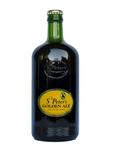
“Traditional malts and English hops… delicate, fresh, grainy after-taste.”
Quite strong hop flavour. Contains malted barley.
St. Peter's Brewery, Bungay, Suffolk, England. 4.7% alcohol.
[ Posté le 6 février 2011 à 11:07 |
pas de
commentaire |
lien permanent ]
Samedi, 5 février 2011
Traduction: [ Google | Babelfish ]
Catégories : [ Bière/Meantime ]
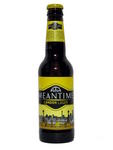
“Kentish hops and East Anglian malting barley”
Just another beer. Contains barley.
Meantime Brewing, London, England. 4.5% alcohol.
[ Posté le 5 février 2011 à 19:01 |
pas de
commentaire |
lien permanent ]
Vendredi, 4 février 2011
Traduction: [ Google | Babelfish ]
Catégories : [ Bière/Orkney ]
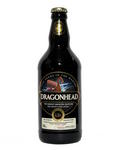
“tribute to the Vikings and their cultural legacy in Orkney… roasted malt
aroma, bitter chocolate, dark roasted coffee and smokey notes balanced by
hints of spicy Goldings hop… chocolate, toast and nut flavours… spicy hop
finish.”
Definitely chocolatey and coffey, only slightly bitter. Quite nice. Contains
malted barley and malted wheat.
Sinclair Breweries Ltd, The Orkney Brewery, Stromness, Orkney, Scotland. 4.0%
alcohol.
[ Posté le 4 février 2011 à 18:35 |
pas de
commentaire |
lien permanent ]





































